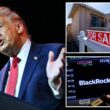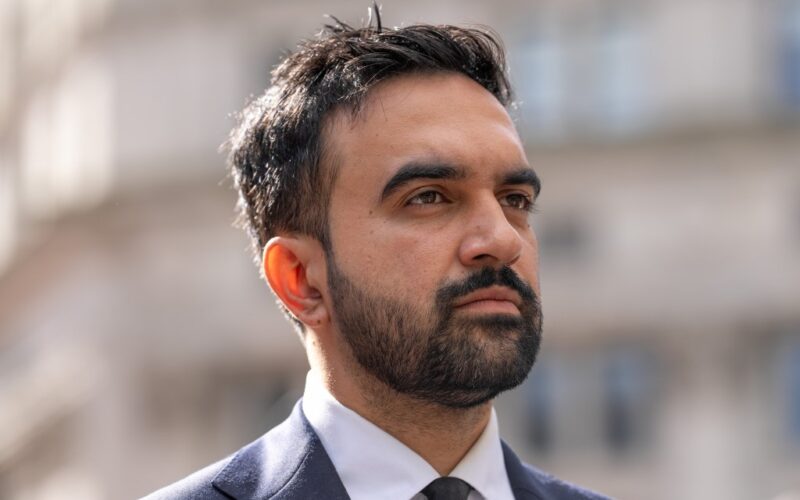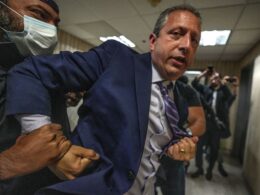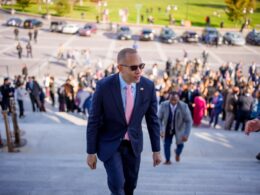Democrat Zohran Mamdani was elected mayor of New York City on Tuesday, becoming the youngest man picked to lead the five boroughs in modern history in what is widely seen as watershed moment for his party’s surging left wing.
Mamdani, a 34-year-old democratic socialist who will also be the city’s first-ever Muslim mayor, was declared the winner of the 2025 race for City Hall by AP shortly after 9:30 p.m., as Board of Elections tabulations showed him leading his top opponent, ex-Gov. Andrew Cuomo, by a margin of about 50-41 percent.
Mamdani — who will now take office Jan. 1 as the youngest mayor in well over a century — was expected to address a crowd at his election night party in Brooklyn late Tuesday night. Hundreds of jubilant supporters at the Mamdani election night party at Brooklyn Paramount reacted to the election call with deafening cheers and chants of “Zohran! Zohran! Zohran!”
Cuomo, who campaigned as an independent, didn’t immediately comment. Curtis Sliwa, the Republican mayoral nominee clinched third place in the race, according to unofficial tabulations.
“Obviously I wish him good luck.” Sliwa said. But, he warned Mamdani, “If you try to implement socialism, if you try to render our police weak and impotent … we are not only organizing we are mobilizing.”
Mamdani’s victory was propelled by nearly record-setting levels of voter participation, with more than 2 million New Yorkers casting ballots in Tuesday’s election — the highest turnout in a local race since at least the 1969 mayoral contest.
Marking the conclusion of the most high-octane New York City mayoral race in decades, Mamdani’s win also gives the Democratic Party’s left wing a major feather in its cap and provides progressives nationally with a potential roadmap for how to campaign in competitive races.
A dues-paying member of the Democratic Socialists of America, Mamdani will as mayor be the leftist group’s highest-ranking elected official in the country, providing the organization with a big bully pulpit.
Mamdani’s win comes after he centered his campaign on tackling the city’s cost of living crisis, with a particular focus on creating more expansive social safety nets for working class New Yorkers. He has proposed paying for such initiatives by increasing taxes on corporations and the wealthy, proposals that generally poll well with Americans of all political stripes.
But Mamdani’s win is also certain to unnerve moderate-leaning Democrats, who worry Mamdani’s unabashed left-wing platform could spark fiscal instability and lead to declines in public safety. Amid his vocal support for Palestinians, Mamdani also took positions and made statements about Israel that some of his moderate critics say fueled antisemitism.
Politically, there’s concern Mamdani’s triumph could backfire and benefit Republicans, especially in next year’s New York gubernatorial race and congressional midterms. President Trump has for weeks vowed to punish New York City with federal funding cuts in the event of a Mamdani win.
Amid it all, Mamdani’s also likely to face pressure next year from his supporters to quickly make good on his agenda — many components of which depend on state government actions that will be out of his hands as mayor and could run into headwinds in Albany.
Queens state Sen. Michael Gianaris, the state Senate’s second highest-ranking Democrat and a Mamdani supporter, did not want to make any promises to reporters at Mamdani’s election night party about getting any specific parts of his agenda through Albany in his first year as mayor.
“[But] I think at a minimum, we can get started and move in a direction of phasing those things in over time,” Gianaris said at the Brooklyn Paramount.
When he announced his mayoral campaign just over a year ago in October 2024, Mamdani was a relatively unknown entity in New York politics, working as a State Assembly member representing a slice of northwestern Queens that includes Astoria.
But Mamdani quickly caught the attention of New Yorkers as he mounted an energetic campaign boosted by a savvy social media strategy and volunteers who canvassed on his behalf. His promises to freeze the rent for stabilized tenants, drastically expand subsidized childcare and make public buses free struck a clear chord with residents across a city that has become increasingly expensive, especially those in younger generations, who turned out in droves for Mamdani.
But even older New Yorkers who didn’t vote for him found Mamdani’s campaign enticing.
“My sentiments are not anti-Mamdani. I have no issue with Mamdani being a socialist Democrat or whatever…I think they just gave him a bad rap in this election,” Queens resident Kevin Moran, an 80-year-old retired cab driver, said after voting for Cuomo in South Ozone Park on Tuesday morning. “If Mamdani wins, I’ll be happy. I think he’ll be able to do everything that comes up as the mayor of the city. He’ll appoint different people. I think it’ll probably be a bit of a rough road for him, but I think he’ll be able to do it.”
In June’s Democratic mayoral primary, Mamdani pulled off a shocking victory, defeating Cuomo in that contest by a nearly 13% margin.
Despite the primary loss, Cuomo, a member of one of New York’s most storied political dynasties, jumped back into the general mayoral election, campaigning as an independent on a “Fight & Deliver” ballot line with a focus on public safety and his breadth of experience in government.
Cuomo’s mayoral race entry was an attempt to rehabilitate his career, having resigned as governor in 2021 while facing likely impeachment amid sexual and professional misconduct accusations he now denies.
Cuomo, a lifelong Democrat, spent the final days of the campaign trying to attract votes from local Republicans, whose support he was seen as needing to have a path to victory, as he trailed Mamdani by double digits in virtually every poll.
For weeks, Cuomo also tried to get Sliwa to drop out of the race. When Sliwa refused, Cuomo publicly pleaded with Republicans to not “waste” their vote on Sliwa and back him instead as the anti-Mamdani candidate.
The pressure campaign on Sliwa came after Mayor Adams decided in late September to abandon his bid for reelection following prodding by Cuomo and his allies.
By contrast, Mamdani, during the general election campaign season, racked up a long line of endorsements from New York political power-players who did not support him during the primary. The included Gov. Hochul, U.S. House Minority Leader Hakeem Jeffries and other moderate Democrats who have otherwise been wary of elements of Mamdani’s leftist platform.
Hochul, in particular, is expected to play an especially meaningful role in determining the fate of Mamdani’s agenda, as her support will be needed to enact the tax increases he has floated as the revenue generators for his main campaign pledges.
So far, Hochul — who’s facing a competitive reelection race next year — has been publicly resisting calls to back Mamdani’s tax hike plans. That could potentially throw a major wrench into one of the most important planks in his platform.
Still, speaking to reporters outside an Astoria polling station on Tuesday morning before voting for himself, Mamdani voiced optimism he’ll be able to make good on his agenda.
“We do not get to choose the scale of the crisis we face, we simply get to choose the manner in which we respond,” he said. “And it is time to finally respond with the urgency that New Yorkers deserve.”












